What do Canadians think a Poilievre Conservative government would and should do?
December 18, 2023
Back in April, I conducted a survey asking Canadians about their expectations and desires for a hypothetical Conservative government led by Pierre Poilievre. Recently, I revisited these questions in our latest Abacus Data survey. I think these questions can help us understand whether the Conservatives have been successful at setting the agenda, whether its larger coalition today is fundamentally different than the smaller one last spring, and what the Liberals might need to do to make the Conservative seem unacceptable to more people.
The results are quite telling.
First, few Canadians are certain that a Conservative government would do any of the things we tested but they are more certain than anything else they will eliminate the national carbon tax. The connection between the Conservative Party and eliminating the carbon tax is deep.
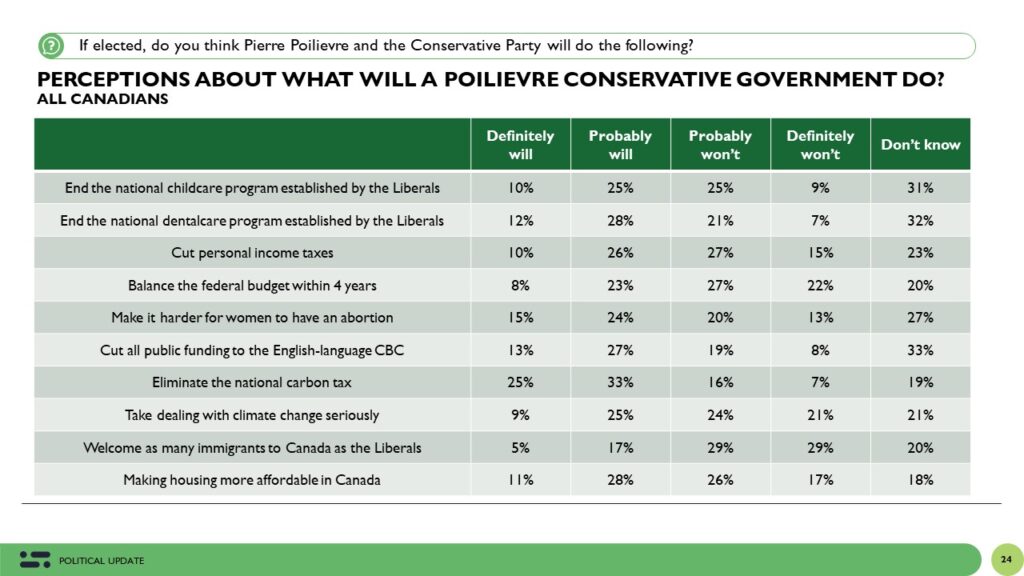
Secondly, the public’s perception of what a Poilievre-led government would or wouldn’t do has remained relatively stable, with a few notable exceptions. There’s been a significant increase in the belief that such a government would eliminate the carbon tax (+14 points), make housing more affordable (+9 points), cut taxes (+6 points), and take climate change seriously (+5 points). The substantial shifts in opinions on the carbon tax and housing affordability underscore the effective messaging and focus of the Conservatives and Poilievre on these issues since Poilievre assumed leadership of the Conservatives.
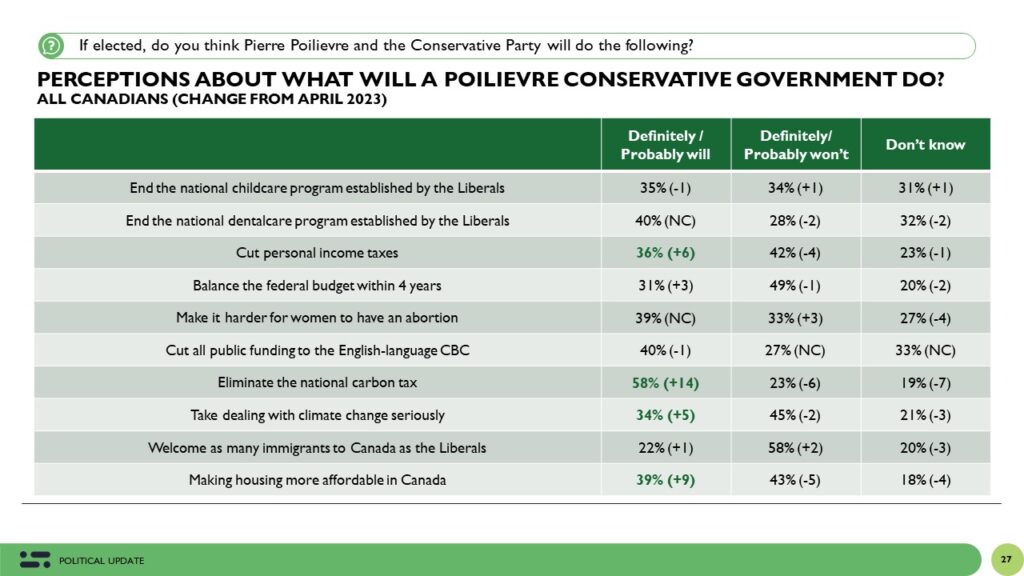
However, when exploring what Canadians think a Poilievre government should do, the picture becomes more complex, especially when considering the current broader Conservative coalition compared to its state in April.
First, the most popular ideas where a clear majority of Canadians want a Conservative government to act on are making housing more affordable, taking climate change seriously, cutting personal taxes, eliminating the carbon tax, and balancing the federal budget.
There is little appetite for ending the national childcare or dental care programs, for limiting access to abortion, or to cutting all public funding to the English-language CBC.
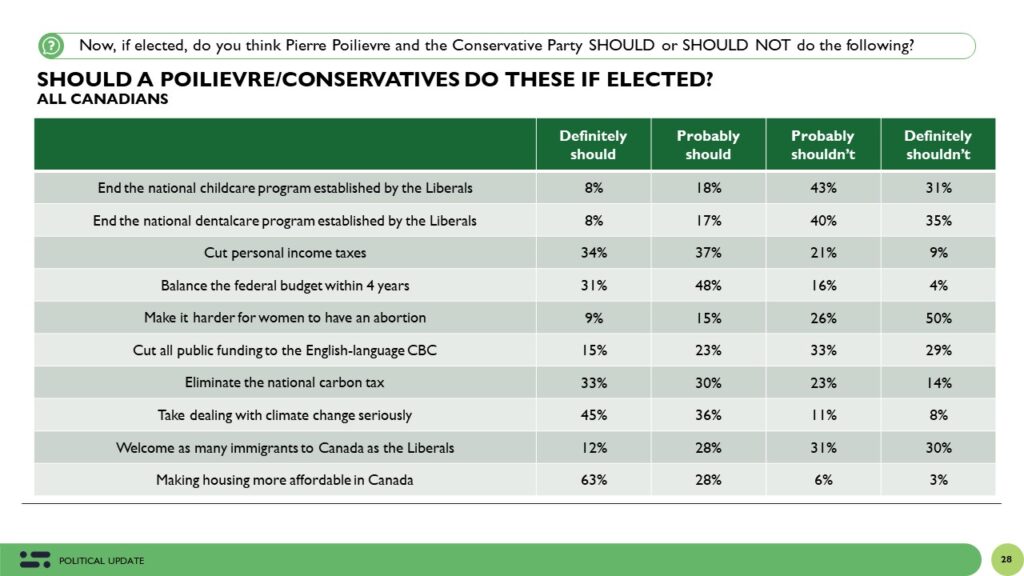
Overall, changes in public opinion have been minimal. Most Canadians don’t want cuts in childcare or dental care. A sizeable minority (about 40%) favors cutting funding to the English CBC, while the majority desire serious action on climate change, balanced budgets, and more affordable housing. Interestingly, there has been a 10-point increase in support for eliminating the carbon tax and a 14-point decrease in the desire to welcome as many immigrants as the Liberals.
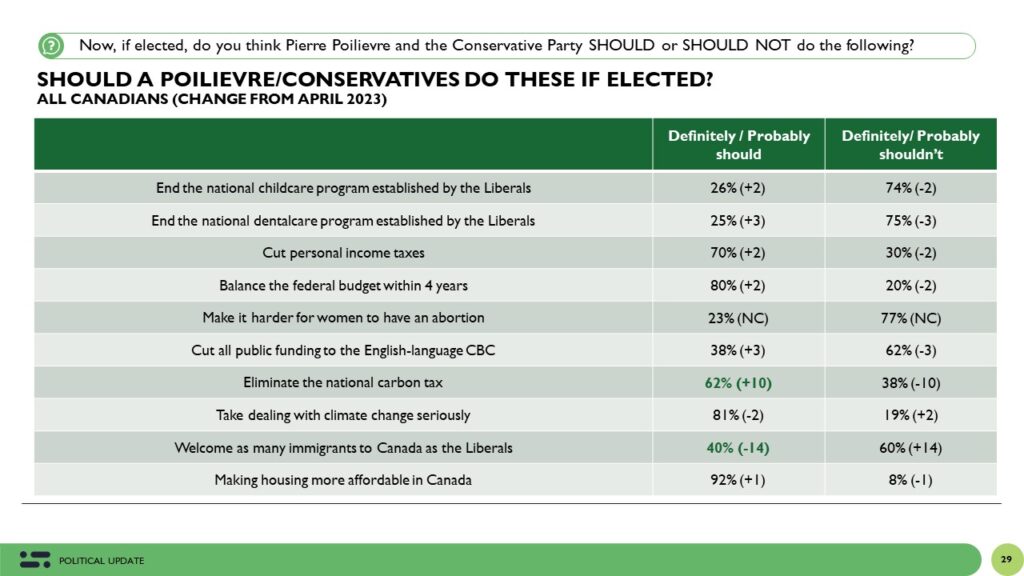
The narrative becomes even more intriguing when we focus solely on current Conservative supporters. We observe significant drops in their support for ending national childcare, reducing abortion access, and cutting funding to English CBC. Conversely, there’s an uptick in the desire for a Conservative government to take climate change seriously.
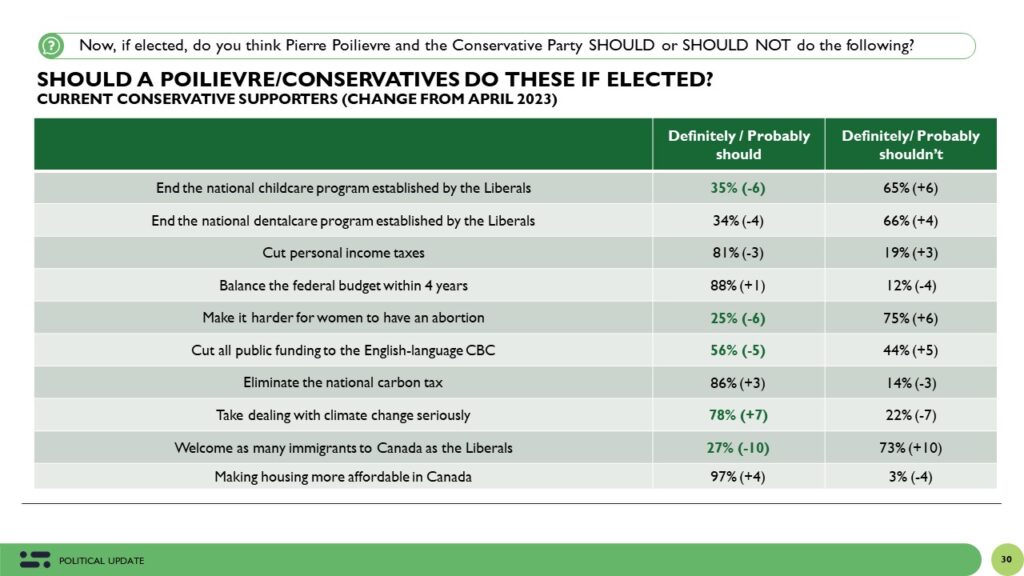
This dichotomy within the Conservative base is noteworthy. While a vast majority (86%) of Conservative supporters advocate for eliminating the carbon tax, a similarly large proportion (78%) wants the party to take climate change seriously. This reflects that the carbon tax has been dislodged as an effective tool to reduce emissions in the minds of most people.
Moreover, the data highlights the difficulty the Conservative Party faces in maintaining its new, broader coalition. The priorities fervently supported by some or all of its traditional base—such as cutting CBC funding, ending national programs, and even restricting abortion access—are not in line with the preferences of a significant portion of its new, larger, less ideological supporter group.
Lastly, the shift in attitudes toward immigration is stark and demands more discussion. The proportion of people desiring a Conservative government to welcome as many immigrants as the Liberals plan to has dropped by 14 points since April.
In summary, these findings from our recent poll paint a nuanced picture of the evolving political landscape in Canada. They signal a complex balancing act for the Conservative Party as it navigates the diverse priorities of its expanded supporter base, while also reflecting broader shifts in public opinion on key policy issues. It also helps explain the drop in vote intentions we measured last week which, I believe, was a response by people to the Conservatives straying off message.
Implications for the Conservatives
The results from the latest poll present a unique challenge for the Conservative Party, particularly in terms of maintaining the integrity of their newly expanded coalition. This broader coalition, while a strategic asset in garnering more support, comes with the inherent risk of ideological inconsistency. Balancing the diverse and sometimes contradictory expectations of this coalition is a tightrope walk for the party leadership.
The central challenge lies in preventing fragmentation of their support base. On one end, there is a risk of leakage to the People’s Party, especially from those who strongly endorse more traditional conservative stances like cutting CBC funding or opposing national programs or want to see less support for Ukraine in its fight against Russia. On the other end, there’s the peril of losing newly gained centrist supporters, who may be more inclined towards moderate policies, particularly on issues like climate change and national programs like childcare or dental care.
Implications for the Liberal Party
The poll results offer a strategic roadmap for the Liberal Party as well. The findings suggest that the Liberals have not fully capitalized on defining what a Poilievre-led government would entail. Many Canadians remain uncertain or have only a superficial understanding of the Conservatives’ potential policy directions under Poilievre’s leadership. This gap presents an opportunity for the Liberals to reassert their narrative and rebuild their coalition.
The Liberals could focus on highlighting policy areas where Poilievre’s new supporters have reservations but currently do not believe the Conservatives will act upon. For example, emphasizing the Conservatives’ stance on issues like climate change, childcare, dentalcare, or the CBC. By drawing attention to these areas, the Liberals can aim to sway soft change voters back into their camp who might be concerned about the Conservative approach to these issues.
Methodology
The survey was conducted with 1,919 Canadian adults from December 7 to 12, 2023. A random sample of panelists were invited to complete the survey from a set of partner panels based on the Lucid exchange platform. These partners are typically double opt-in survey panels, blended to manage out potential skews in the data from a single source.
The margin of error for a comparable probability-based random sample of the same size is +/- 2.3%, 19 times out of 20.
The data were weighted according to census data to ensure that the sample matched Canada’s population according to age, gender, educational attainment, and region. Totals may not add up to 100 due to rounding.
This survey was paid for by Abacus Data Inc.
Abacus Data follows the CRIC Public Opinion Research Standards and Disclosure Requirements that can be found here: https://canadianresearchinsightscouncil.ca/standards/
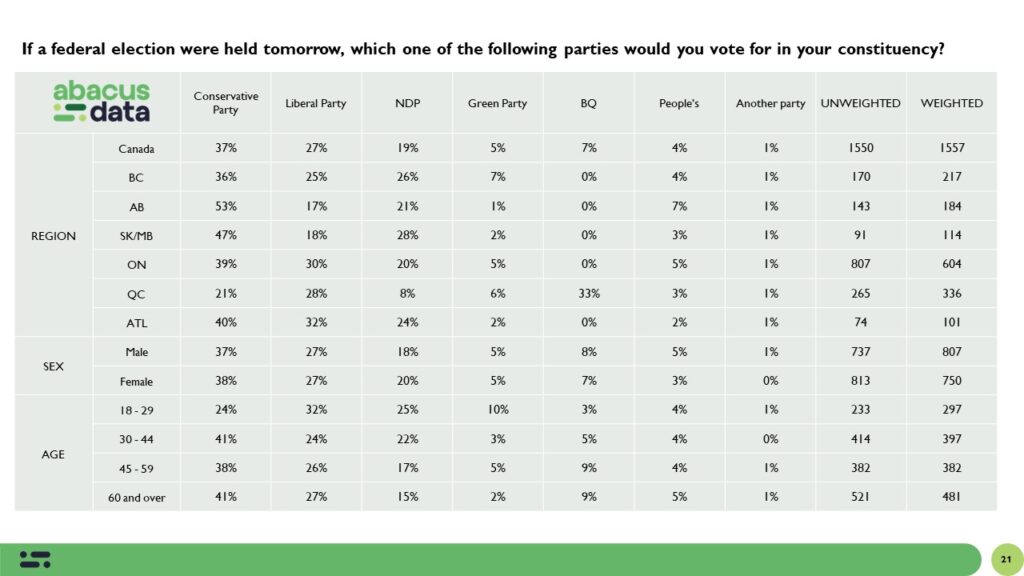
ABOUT ABACUS DATA
We are the only research and strategy firm that helps organizations respond to the disruptive risks and opportunities in a world where demographics and technology are changing more quickly than ever.
We are an innovative, fast-growing public opinion and marketing research consultancy. We use the latest technology, sound science, and deep experience to generate top-flight research-based advice to our clients. We offer global research capacity with a strong focus on customer service, attention to detail, and exceptional value.
We were one of the most accurate pollsters conducting research during the 2021 Canadian election following up on our outstanding record in 2019.
Contact us with any questions.
Find out more about how we can help your organization by downloading our corporate profile and service offering.



